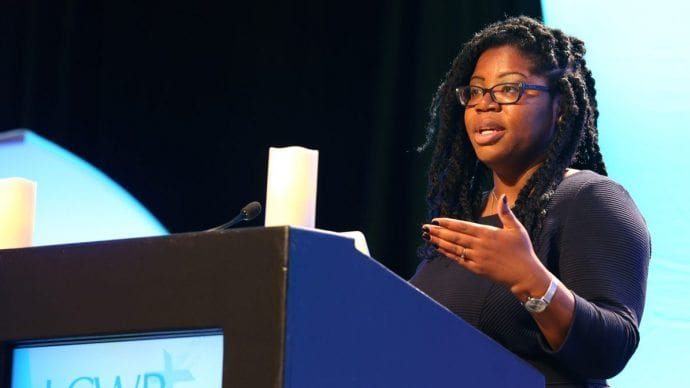When it comes to the earliest orders of Black Catholic religious sisters in the United States, Shannen Dee Williams wants people to recognize the perseverance, struggle and commitment to God they put forth to make religious life possible for Black women and girls in the United States – something she considers overlooked.
Williams, an assistant professor of history at Villanova University, understands the sisters’ legacy through years of interviews and sifting through records. And when she asks Black Catholic sisters about their legacy, they understand it too.
“We made the church Catholic,” Williams recalls the sisters telling her. “Racial segregation, exclusion, have no place in the Catholic Church. If we had not fought to answer God’s call on our lives but also fought to serve our communities, the church would not be where it is today.”
Williams gave a presentation on Thursday at the Catholic University of America, “The Real Sister Act: Why the Stories of Black Catholic Sisters Matter,” where she went in depth about what these women endured at a time where neither society nor the church necessarily accepted them.
Williams – in the process of completing her first book, Subversive Habits: Black Catholic Nuns in the Long African American Freedom Struggle – also made the point that the legacies of these women were on full display on Jan. 20 as Amanda Gorman, a Black Catholic woman and poet, read a poem she wrote at the inauguration of President Joe Biden.
“Indeed, the photograph of Gorman, positioned between Biden and Harris and calling for justice and national unity, may very well go down as one of history’s most important images,” Williams wrote in “Black Catholic women like Amanda Gorman are forgotten prophets of American Democracy,” a perspective piece for the Washington Post.
“[…] Gorman brought forward a revolutionary and womanist tradition of Black Catholicism that far too many people deny exists. She also powerfully reminded her nation and church that Black women and girls are some of its most formidable prophets of democracy and Catholicism.”
The piece, like her Catholic University presentation, details the plight of the earliest Black Catholic women’s religious orders.
The Oblate Sisters of Providence in Baltimore, Maryland, was the first successful Black Catholic order in the United States, founded in 1828 by Mother Mary Lange. Lange is now a Servant of God, a step on the path to sainthood.
The school Lange and the Oblate Sisters created was the first Catholic school open to Black girls. Williams also notes that the Oblate Sisters were the first order of Catholic sisters to stand against slavery.
“The Oblate Sisters are important,” Williams said. “Not only do they not rely on enslaved labor, they do not own any enslaved people. They are the first community that will accept formerly enslaved women into their ranks.”
The country’s second successful Black Catholic women’s order, the Sisters of the Holy Family, was founded in New Orleans, Louisiana, in 1842. Through her research Williams discovered that through their first 30, 40, or even 50 years the community “was not allowed to wear veils in public. They had to be marked as different.”
Through the hardship each of the earliest sisterhoods endured they still forged ahead and made strides towards freedom and equality. For instance, they enabled Black people to attend Catholic universities. To do so, they found white progressive allies at Catholic institutions to make exceptions for them to attend, then, they negotiated an agreement, Williams said.
“In their records, they say that when we were negotiating the admission of our sisters into these institutions we made it clear that it couldn’t just be us. It had to be the entire community if we did well. That would be the agreement,” she said.
According to Williams, it wasn’t until World War II, however, that there was also some desegregation within Catholic religious orders in the United States. She notes that to that point Black women would only be accepted if they were “racially ambiguous.”
At that time in addition to the Oblate Sisters and Sisters of the Holy Family, there were also the Franciscan Handmaids of the Most Pure Heart of Mary, in Savanah, Georgia; and the Sisters of the Good Shepherd in Baltimore – both of which still exist today.
The white religious communities would take Native American women, Latino women and women of Asian descent, “but the barrier always comes up with Blackness,” Williams said. And even after World War II, it was still a small cadre of progressive white priests and sisters who pressured white communities to reconsider their anti-Black admission policies, she added.
The sacrifice, perseverance and strides made by Black religious sisters in the United States both in and outside of the faith was a precursor to the civil rights movements that soon followed. They had already de-segregated some universities and began to make the same strides in some religious communities. As Williams describes, they were “seasoned veterans in the Black freedom struggle.”
“What’s always important to remember is that beginning in 1945, many of these women who desegregated so many of these white orders had already desegregated their Catholic high schools, they’re already seasoned veterans in the Black freedom struggle by the time the church gets involved in the Civil Rights movement,” Williams said.

